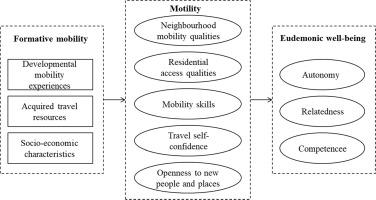Transportation Research Part A: Policy and Practice ( IF 6.3 ) Pub Date : 2020-09-28 , DOI: 10.1016/j.tra.2020.09.001 Rebecca Shliselberg , Moshe Givoni , Sigal Kaplan

|
This study establishes a quantitative relationship between formative mobility, motility and eudemonic well-being. The behavioral framework is proposed as an aid for measuring motility, understanding its driving forces and its derived eudemonic well-being. Formative mobility consists of past mobility experiences, aquired mobility resources and socio-economic characteristics. Motility is assessed through components of personal access, skills and cognitive appropriation and cover: neighborhood mobility qualities, residential access qualities, mobility skills, travel self-confidence, openness to new people and places. Eudemonic well-being is measured using the three aspects of the Self-Determination Theory: autonomy, relatedness and competencies. A tailor made questionnaire was designed to collect the data. The proposed behavioral framework is validated with a structural-equation model estimated based on a sample of 822 women in Israel. The results show: i) past mobility experiences and aquired travel resources are positively correlated with current perceived motility, ii) mobility skills, travel self-confidence, openness to new people and places are associated with autonomy and environmental mastery, ii) openness to people and places is linked to a higher degree of self-acceptance, iii) mobility skills are positively related to higher personal growth and purpose, iv) access, mobility skills and openness to new people and places is linked to positive relations with others (relatedness).
中文翻译:

衡量运动能力的行为框架:将过去的运动经验,运动能力和幸福感联系起来
这项研究建立了形成性活动能力,运动能力和幸福感之间的定量关系。提出了行为框架,以帮助衡量运动能力,了解其驱动力及其衍生的幸福感。形成性流动包括过去的流动经验,获得的流动资源和社会经济特征。流动性通过个人通道,技能和认知能力的组成部分和覆盖范围进行评估:邻里流动性,居住通道性,流动性,出行自信心,对新人和新地方的开放度。使用自我决定理论的三个方面来衡量幸福感,即自治,亲和力和能力。设计了量身定制的问卷以收集数据。拟议的行为框架已通过根据以色列822名妇女的样本估计的结构方程模型进行了验证。结果表明:i)过去的出行经历和获得的旅行资源与当前感知的动力呈正相关; ii)出行技能,旅行自信心,对新人和新地方的开放与自主权和对环境的掌握有关; ii)对人的开放性并且地点与自我接纳程度较高相关; iii)流动能力与个人成长和目标提高呈正相关; iv)接触,流动技能和对新人的开放性与地点与他人的积极关系相关(相关性) 。











































 京公网安备 11010802027423号
京公网安备 11010802027423号